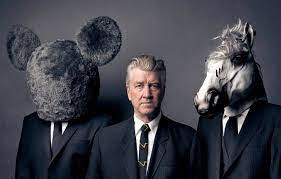David Lynch: A Surrealist Legacy in Film and Television
- João Falanga
- Jan 17
- 3 min read

David Lynch, renowned American filmmaker, has passed away at the age of 78 , leaving an indelible mark on the world of entertainment. Known for his dark and surreal narratives, Lynch received four Oscar nominations throughout his career.
Early Career and Rise
Initially interested in pursuing a career as a painter, Lynch studied art before turning his attention to producing short films. In 1977, he released his first feature-length film, "Eraserhead", which has since become a cult classic.
Recognition and Notable Works
Recognition came with "The Elephant Man" (1980), starring John Hurt and Anthony Hopkins, which received eight Academy Award nominations, including Best Director for Lynch. After a setback with "Dune" (1984), he returned to success with "Blue Velvet" (1986), receiving another Oscar nomination for Best Director. In 1990, "Wild at Heart" won the Palme d'Or at the Cannes Film Festival.
Revolution in Television: "Twin Peaks"
In 1990, Lynch revolutionized American television with the mystery series "Twin Peaks," which investigated the death of a high school student in a small town. The series achieved cult status even after its cancellation after its second season, leading to a film in 1992 and a new season in 2017.
About the series, I wrote about it at the beginning of this blog:
In 1990, when the internet was still a distant concept for most, a television series emerged that challenged all established conventions. 'Twin Peaks', created by David Lynch and Mark Frost, not only introduced the enigmatic mystery of "who killed Laura Palmer", but also redefined what a TV series could be.
The Rise of 'Twin Peaks'
A Small Town with Big Secrets
Set in the fictional town of Twin Peaks, the plot begins with the discovery of the body of Laura Palmer, a popular high school student, wrapped in plastic on the banks of a river. This event triggers an investigation that reveals the dark secrets hidden beneath the tranquil surface of the community.
Surreal Elements and Innovative Narrative
Lynch and Frost wove a narrative tapestry that blended elements of mystery, paranormal activity, and quirky humor. Eccentric characters, such as the enigmatic "Log Lady," and dreamlike scenes contributed to a unique atmosphere that challenged the television norms of the time.
The Television Revolution
Paradigm Shift in Open TV
Broadcast by ABC, one of the main broadcast TV networks in the United States, 'Twin Peaks' dared to present complex and thematically bold content in a traditionally conservative medium. In Brazil, the series was shown on Sunday nights by Rede Globo, expanding its reach and cultural impact.
Pressures and Premature Cancellation
Despite its innovation, the series faced pressure from the network to quickly resolve the central mystery, leading to a rushed ending and cancellation after the second season. However, the legacy of 'Twin Peaks' was already established, demonstrating that television could be a vehicle for bold and artistic storytelling.
The Triumphant Return in 2017
Initial Skepticism
When a third season was announced in 2017, 26 years after its original cancellation, many fans, including critics, questioned the need to revisit the series. There were concerns that a new season could tarnish the reputation of the original series.
A New Masterpiece
Contrary to expectations, the third season, consisting of 18 episodes directed by Lynch, was acclaimed as one of the best television productions in history. With a dreamlike narrative, quirky humor and an impeccable soundtrack, the season brought back beloved characters and introduced new mysteries, further solidifying the series' cult status.
"Mulholland Drive" and Continued Recognition
For younger generations, Lynch is best remembered for the surrealist thriller Mulholland Drive (2001), which launched the career of actress Naomi Watts. The film earned Lynch the Best Director award at the 2001 Cannes Film Festival and an Oscar nomination.
Philosophy and Meditation
Lynch has practiced transcendental meditation since the 1970s, crediting it with inspiring his films. In 2008, he visited Brazil to promote his book "In Deep Waters – Creativity and Meditation", sharing his insights on how meditation can open doors to deeper levels of creativity.
Lasting Legacy
David Lynch leaves behind a legacy of works that defy convention and explore the deepest recesses of the human mind. His unique approach will continue to influence filmmakers and intrigue audiences for generations to come.






Comments